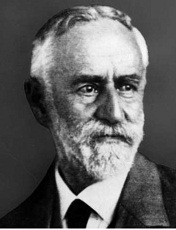Alfred Hettner
From Geography
Contents |
The life of Alfred Hettner
Alfred Hettner (1859-1941)was a German geographer who is known for his contributions to the modern development of geography in Germany, with his concept of chorology and his own geographical journal "Geographische Zeitung". He was born in Dresden and studied Geography at the universities of Halle-Wittenberg and Bonn. Hettner practiced geography from a philosophical and scientific perspective and traveled all over the world to do field research. During his studies Hetnner was a pupil of Richtenhofen and Ratzel, and while finishing work on his doctorate at the University of Strasbourg, he became increasingly fascinated with philosophy. Especially the German philosopher Immanuel Kant influenced his views on the nature of geography, but also various great German geographers influenced him. From 1899 until 1928 Hettner served as a professor at the University of Heidelberg, and became a mentor of a number of students which distinguished themselves as geographers. Hettner died at the age of 82 in Heidelberg (Hettner, in Encyclopædia Britannica, 2010).
Chorolog
The most important contribution of Hettner in the development of the modern geography is that geography should be seen as fundamentally chorology. Which he also called the study of geographic distributions over the earth's surface. He used the term chorology to give meaning to the study of geography, in which it was able to distinguish itself from other sciences. This chorological geography was divided into two groups, the astronomical sciences studying phenomena in space, and the second group studying phenomena on the earth's surface. The study of phenomena on the earth's surface was concerned with human interconnections and interaction with the natural environment, and also the arrangement, by region, of the earth's physical phenomena. The study of these regions, also called ‘Länderkunden’, were published according to a certain diagram called ‘Länderkundliche Schema’. Because especially in the western societies human activities were increasingly under influence of social-economical factors, instead of natural factors, over time ‘Ländeskunde’ lost its meaning.
Important work
Hettner was the founder of an influential geographical journal called the ‘Geographische Zeitung’ first published in 1899, in which he elaborated on his ideas and methodology of geography for over 40 years. Other works of Hettner include:
- Das Europäische Russland. Eine Studie zur geographie des Menschen (1905)
- Grundzüge der Länderkunde (1907, not published until 1924)
- Die Geographie, ihre Geschichte, ihr Wesen und ihre Methoden (1927)
- Vergleichende Länderkunde (4 volumes, 1933-35)
- Handbuch der Geographischen Wissenschaft (11 volumes, completed in 1940)
References
Ostermeier, J.F. (1987). De opvattingen van Alfred Hettner (1859-1941) over de plaats van de geografie in het systeem van wetenschappen. Diss. Katholieke Universiteit van Nijmegen
Alfred Hettner. (2010). In Encyclopædia Britannica. Retrieved October 21, 2010, from Encyclopædia Britannica Online: http://www.britannica.com/EBchecked/topic/264447/Alfred-Hettner
==Contributors
- Published by Ivar le Loux & Jorg Schröder
- Page enhanced by Lars Paardekooper 20-10-2012
- Picture added by Michiel van Rijn--MichielVanRijn 22:43, 25 October 2012 (CEST)
